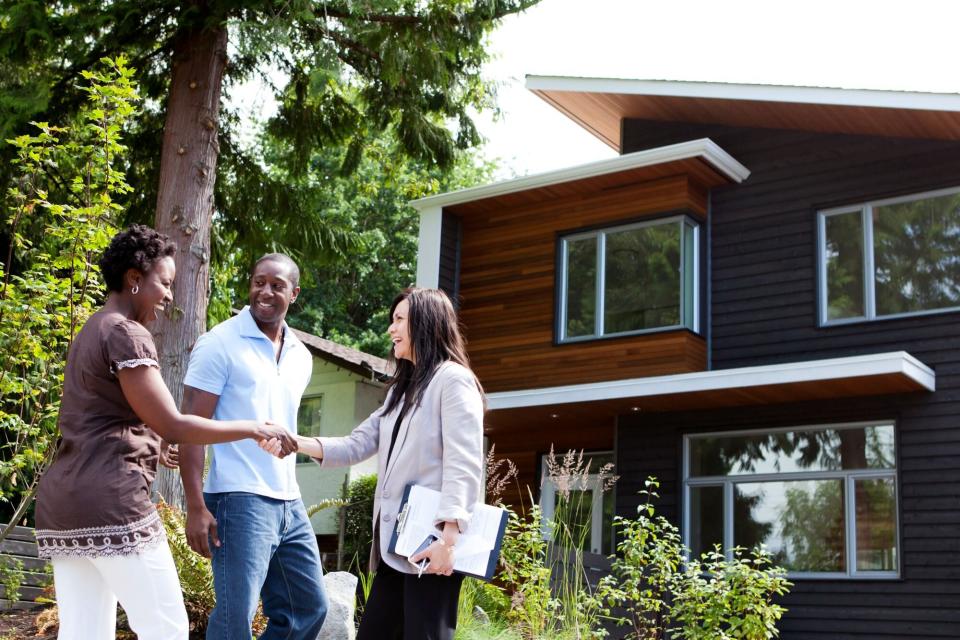What You Need to Know About Buying a Second Home
For those who love to travel, especially to the same locales, buying a second home can be quite beneficial. Instead of securing a place to stay each time you plan a trip, you'll have your own private retreat to visit. You may even be able to use it as a rental property down the line. But for all of the obvious pros, it's important to remember that purchasing and owning another home isn't quite the same as the process you likely went through when you bought your primary residence. Ahead, three experts weigh in on the most important aspects to consider before buying a second home.
Related: What to Know About Buying a Home in a Seller's Market

Noel Hendrickson / Getty Images
Think of finances.
You'll likely need to provide many of the same documents you did when you applied for a mortgage for your existing home, but you'll have a few extra qualifications to meet, according to Shelby McDaniels, channel director for corporate home lending at Chase. "Financing a second home adds additional financial pressure to a homeowner," she says. "As such, lenders want to ensure a borrower's ability to repay the loan." This means you may need to a have higher credit score, lower debt-to-income (DTI) ratios, a larger down payment, and extra funds in reserve. Additionally, the house itself will have to meet certain qualifications. McDaniels says that among other qualifications, the property will need to be occupied by you for a portion of each year, it can't be rented or run by a management firm, and it must be located in an area that is typically used by second homeowners to be considered a second home.
Try (the location) before you buy.
Rachel Louchen, a licensed real estate agent in Connecticut and Massachusetts, recommends spending time in the area you are interested in buying to understand how urban or remote it is. "It's possible a buyer wants to be isolated in the middle of nowhere or close enough to walk into a coffee shop," she says. Louchen also recommends having in mind if you want to be in a rural location or how far out of town you want to be at all times of the year. "On a day in July, you could have all your friends over for a weekend, and then the next thing you know, you all-wheel drive because there's not a way to access your house in February."
Your needs will likely differ the second time around.
Your needs and preferences will likely look a bit different now, too. For example, you may be more interested in a low-maintenance property that allows you to spend your time there relaxing instead of working on home improvement projects, suggests real estate agent Karen Kostiw of Warburg Realty. You should also be prepared to spend more time house hunting online. "Today's buyers for second homes rely on virtual photos including aerials, 3D tours, as well as Zoom/FaceTime showings to aid them in their selection."
Contemplate the hidden costs (and benefits).
Owning a second home can be very beneficial, especially if your family already vacations in the same place annually. But if you're considering purchasing one as an investment, Natalie Campisi, mortgage and housing analyst of Forbes Advisor says you need to remember that just like other types of investment opportunities, real estate can be fickle. "Most experts advise buyers to look at real estate as a long-term investment to maximize their returns," she says. "That means be ready to hold onto your property for many years if you're looking for profits."
Connect with your accountant.
Maggie Fromm, a licensed agent in the Capital Region of New York, suggests speaking with your accountant or tax professional to look at how the purchase may impact taxes and how property-specific tax exemptions may apply (or not) to a second home. "Depending on the state, buyers may not get the same tax benefits that they would on your primary residence that you would on a second home."
Also, your tax situation may look a little different depending on how you use your second home. "Vacation homes are similar to your primary residence in that you can deduct mortgage interest, property taxes, and mortgage insurance payments," Campisi says. "However, vacation homes don't qualify for homestead exemption, which is a tax benefit for people in states like Florida, which reduces their property tax liability." Additionally, you'll want to make sure the homes you're looking at aren't so far away that the travel time and costs associated with getting there will make you less likely to actually visit the property. "If it's too far, it will be too much of a hassle to use it," says Kostiw.
Consider if you want a fixer-upper versus a move-in-ready home.
A fixer-upper may appear to be a cost-saver, but Louchen suggests considering if it's a priority for your new home to be move-in ready. "A lot of people say they want fixer-uppers, and then they get to one, and they don't want to do anything," she says. "Figure out if you want to just move in with your toothbrush, or are you prepared to rent while you're fixing it up?"
A pre-approval letter is critical.
Both Fromm and Louchen agree that even if you own a house and plan to get a mortgage, a letter saying that you can get a mortgage is essential, making the process go much faster and often creating an offer more desirable for a seller. "You don't have to commit to working with that bank," says Louchen, "but it's good to know a number. It could be the case where you can afford more or less than you thought."

